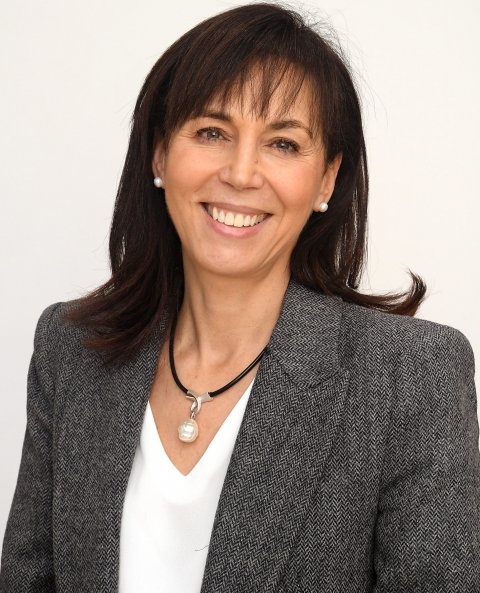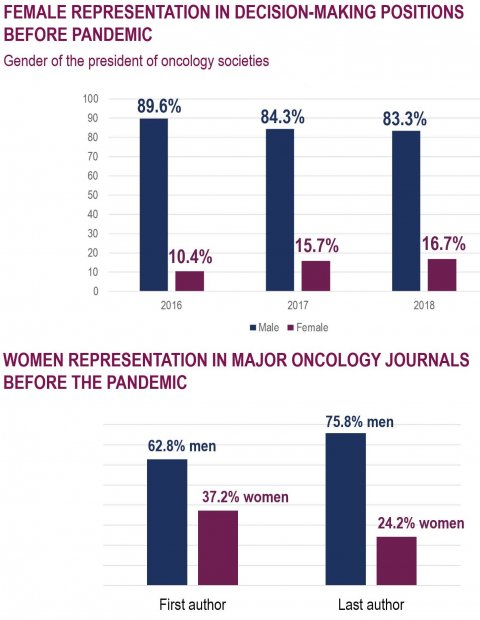Article • Women & research
Covid-19 and gender parity: a worrisome scenario
The pandemic could challenge what little achievement has been made so far in the field, a prominent Spanish medical oncologist explained during the virtual European Lung Cancer Conference (ELCC 21) organized by the European Society of Medical Oncology (ESMO) last March.
Report: Mélisande Rouger
Image source: DavidRockDesign from Pixabay

Covid-19 and its economic fallout have made women more vulnerable. They are likelier to lose their jobs than men, partly because the crisis significantly increases the burden of unpaid care, which is disproportionately carried by women. Women have also published less during the pandemic and about the pandemic, data shows. Women’s posting rates on preprint servers has slowed during the first two months of the crisis. When compared with March and April 2019, the number of male authors who posted on those servers has grown faster than the number of female authors in the same period in 2020.
Besides, women account for only one third of authors who published on topics related to Covid-19. “Maybe that’s why we’re losing a part of the gender dimension of Covid-19, even from the research area,” said Pilar Garrido, an associate professor of medical oncology at Alcalá University near Madrid, in her online presentation. Garrido is chair of the ESMO Women for Oncology (W4O) committee. The group launched a survey last year to assess the impact of the Covid-19 crisis on work and home life for professionals in the field. “Our special concern was also related to the potential influence on the potential career in young oncologists,” she said.
With the crisis comes the risk of losing what little achievement we have made so far. We need to explore new ways of collaborating and networking, including mentorship sessions, forums at virtual congresses and roundtables in social media
Pilar Garrido
Preliminary results show that the pandemic affected the careers of the respondents in a negative way. But there was little participation of men in the survey. Early data also reveals that women have been less present than men on Covid-19 advisory groups, as recently highlighted by the European Commission. More men than women declared having spent more time on science, research and publication, while more women declared having spent less time on these activities.
The definitive results of the W4O survey will be available later this year, along with another survey on perception of gender challenges and an exploratory study in Asia. “Our mission is to raise awareness and promote equal access to career-development opportunities for women oncologists, while providing a platform for networking with other women oncologists and national groups,” she said.
Recommended article

Video • 'Women in Focus' at ECR
Getting to the top, staying feminine
Women continue to lead a rather marginal existence in medicine. Although there are now more female than male medical students, professorships and directorships are almost exclusively held by men. This imbalance was addressed with the lecture series ‘Women in Focus’ at the 2019 European Congress of Radiology (ECR).
Potentially widening the gap

Before the pandemic, the committee found that very few women held decision making positions, although things had slightly improved recently. 10.4% of presidents of oncology societies were women in 2016, vs. 15.7% in 2017 and 16.7% in 2018 (see upper graph).
There was also a gender divide in research and publications before Covid. In 2019 women only represented about 30% of all research grants PIs. In high impact journals, they only made up for 38% of first authors and 24% of last authors (see lower graph).
In 2019, the Lancet asked if the academic publishing system was gendered and looked at internal processes. Women represented 79% of the editorial staff and 57% of the editors in chief across the group’s 14 journals. However, women only accounted for 30% of the editorial advisory board members and there were fewer women in the peer review and commissioned content sets. “This is a vicious circle,” Garrido said. “Women have fewer publications, so they probably have less opportunities for funding, being promoted and advanced. There is a risk of poor representation in decision-making, poor participation in peer review and fewer publications. There is a clear bias and unconscious bias and a large room for improvement.”
To narrow the gap, the W4O committee will continue to observe, support and report about the situation in medical oncology. “With the crisis comes the risk of losing what little achievement we have made so far. We need to explore new ways of collaborating and networking, including mentorship sessions, forums at virtual congresses and roundtables in social media. We need to advocate for gender balance to remain a priority in the agenda,” she concluded.
Profile:
Pilar Garrido is associate professor of medical oncology at Alcalá University and serves as head of the thoracic tumors section in the medical oncology department at Ramón y Cajal University Hospital in Madrid, Spain. She is co-director of the Cancer and Chronic Disease Research Group at the Ramón y Cajal Health Investigation Institute. Her main areas of research and clinical interest are thoracic tumors. She’s an active member of CiberOnc, building a translational program in collaboration with other clinical and experimental biology Spanish cancer groups. She was the first woman president of the Spanish Medical Oncology Society. She currently participates in a variety of national scientific committees and is engaged with Spanish national political and administrative institutions. She is a member of the Spanish National Cancer Strategy Committee, former president of the Minister of Health Specialty Training Advisory Council and the Medical Oncology Specialty Training Committee. She is a member of the ESMO Council and also serves as a member of the ESMO Fellowship Committee, Press and Media Affairs Committee and the Leadership Generation Task Force. She is also associate editor of Annals of Oncology and a member of the ESMO Faculty for lung and other thoracic tumors.
21.04.2021











